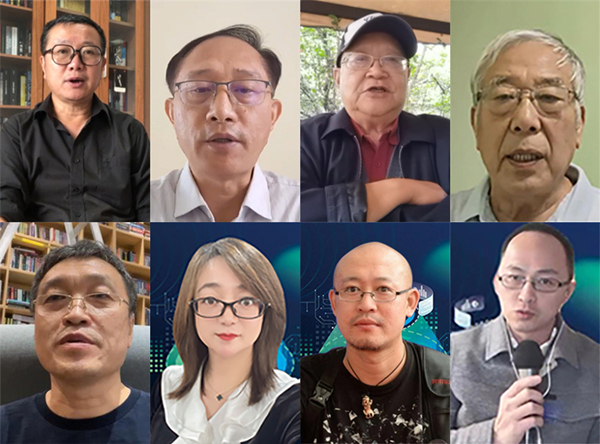Online sci-fi salon discusses boosting Chinese teens' scientific literacy
- By Zhang Rui
 0 Comment(s)
0 Comment(s) Print
Print E-mail China.org.cn, October 12, 2022
E-mail China.org.cn, October 12, 2022
An online sci-fi salon held on Monday invited top writers, editors and experts in the fields of sci-fi and popular science to explore how to boost scientific literacy among Chinese youth by promoting sci-fi works and culture.

"Teenagers are the most important target audience for sci-fi works, and are the most important force to support the future development of science fiction," said prominent Chinese sci-fi writer Liu Cixin, whose works include the world-famous "The Three-Body Problem." Liu pointed out that sci-fi can help improve young people's scientific literacy, inspire their curiosity and imagination, enhance their interest in science, boost their awareness and ability for innovation, and gradually establish and shape their scientific world view as well as outlook on life and values.
Wang Ting, director of the China Research Institute for Science Popularization (CRISP), agreed, and recognized sci-fi literature for its ability to stimulate teenagers' imagination and creativity as it is based on cutting-edge technologies. But besides the genre creating novelty and wonder, he believes that writers should also guide young people toward the light of science by integrating correct values and visions, and help them build a new universe of fantasy arts.
Wang Jinkang, another top sci-fi writer, noted that children's sci-fi literature is often treated less seriously. "But the facts prove that teen sci-fi literature lays a solid foundation for the development and spread of core sci-fi works," he said. "Only by helping more children fall in love with reading sci-fi from a young age can the industry grow bigger and stronger."
Wu Yan, a sci-fi scholar, writer and professor at the Southern University of Science and Technology, believes that scientific literacy is extremely important for young people, especially in the current era. He added that the improvement of China's international status is closely related to the development of its science and technology and improvements in scientific literacy.
"In the new era, scientific literacy also has a new definition," he said. "It has become knowledge that can be flexibly used and a method that can be used to analyze the effects on people, rather than just memorizing dogmas. In this sense, sci-fi is of great value to improving scientific literacy." Wu also pointed out that when people read science fiction stories and question the technologies in them, they can really improve their scientific literacy when carrying out extensive scientific inquiries and research. "Science fiction always contains imagination with doubts that need to be questioned. Real scientific literacy is alive and exploratory."
The salon, which was themed "Let the future shine into reality, give wings to imagination: Improving scientific literacy among young people through science fiction," was later joined by nearly 30 renowned sci-fi and popular science writers, editors and experts. Together, they discussed topics including how to guide teens to form correct values through children's sci-fi works, how to effectively integrate cutting-edge technologies into writings, how to help teens easily understand sci-fi and technology concepts in stories, and how to write works that consider children's mentality and spiritual demands.
The event was guided by the Department of Science and Technology Popularization of China Association for Science and Technology (CAST), sponsored by the China Science Writers Association (CSWA) and the development service center of CAST's brand of China Science Communication, and co-organized by Heilongjiang Science and Technology Publishing House and the China Children's Sci-fi Union.
Xue Fangwen, president of Heilongjiang Science and Technology Publishing House, revealed plans to publish numerous teen sci-fi and popular science works during the coming year and to gather the force of more Chinese writers to establish domestic full-industry-chain literature intellectual properties and franchises in the future to boost China's children's sci-fi industry.
According to Chao Xia and Lu Yang, well-known Chinese sci-fi writers and co-founders of the China Children's Sci-fi Union, the union will cooperate more extensively with the publishing house and organize an in-person forum in the future. The union, which was founded in 2021, will also work with various individuals, companies and institutions in the sci-fi industry as well as publishing, technology and film and TV fields to promote sci-fi among youngsters and help boost their scientific literacy.
Dong Renwei, a veteran sci-fi mogul, concluded that young people are the future of the country and that reality has become "more sci-fi" thanks to technological progress. "I hope that sci-fi works can plant seeds in their hearts," he said. "And in the future, they can become significant scientists, artists, writers, or entrepreneurs to turn sci-fi into reality and change our lives."






Go to Forum >>0 Comment(s)